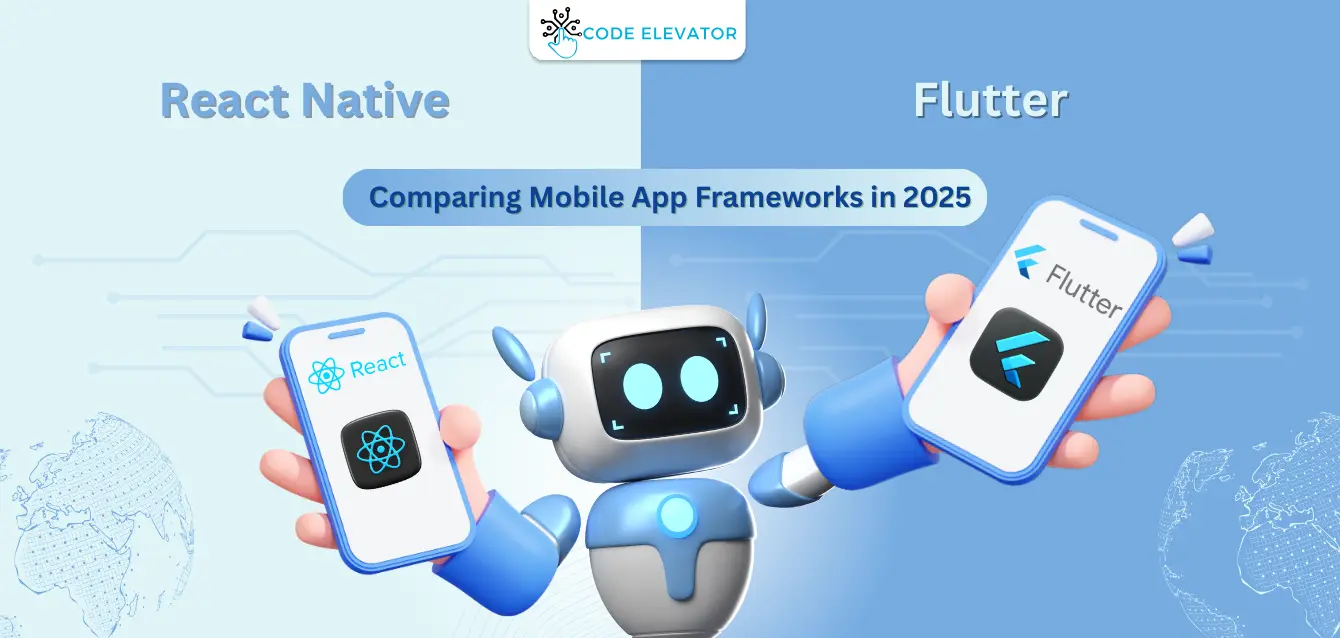Table of Contents
Introduction
If it’s about mobile application development frameworks by 2025, the debate usually is boiled down to one issue: Flutter vs React Native–which is superior? Both frameworks have a strong hold on cross-platform development and allow companies to develop applications for iOS as well as Android at the same time.
The debate regarding React Native vs. Flutter is now more pertinent than any time before, since the two ecosystems have both evolved. Since both enterprises and startups depend on these tools, making a choice between Flutter and React Native is now one of the key decision-making processes in today’s software development.
Understanding the Frameworks
Before you dive into the contrast first, you must understand the features each framework provides.
What is Flutter Technology?
Flutter, which was developed by Google, is an open-source framework which uses the Dart programming language. It’s renowned because of it’s “write once, run anywhere” method, which is a built-in widget that provides perfect pixel UI across different platforms.
- Are You Thinking Flutter Is Free to Download and Use? Yes, Flutter is completely and freely accessible for use and download.
- Developers tend to favor Google’s platform due to its reliable UI rendering and strong support by Google.
What is React Native Framework?
React Native is a framework developed by Facebook (Meta) It is an open-source framework that permits developers to utilize JavaScript as well as React to create applications for mobile devices.
- What is React Native an application framework? Yes, it’s an interoperable framework created for hybrid applications.
- Focusing on reuse of code and being seamlessly integrated with existing web technology platforms.
Flutter vs. React Native: Differences to Consider
Programming Languages: Dart vs JavaScript
- Flutter makes use of Dart, an optimized language to be used for UI development.
- React Native utilizes JavaScript which makes it available to a vast number of developers.
UI Rendering
- Flutter uses its own rendering engine with custom widgets designed to mimic native.
- React Native is an adaptable solution, seamlessly linking JavaScript with native components through third-party libraries that offer flexibility.
Performance & Compare: Flutter vs Native
- Flutter uses its own rendering engine with custom widgets designed to mimic native.
- React Native is an adaptable solution, seamlessly linking JavaScript with native components through third-party libraries that offer flexibility.

Popularity and Industry Adoption
Flutter Statistics in 2025
- More than 50% of the latest cross-platform applications were created using Flutter.
- A huge amount of people are using Google, Alibaba, BMW as well as other international brands.
React Native Advantages & Competitors
- A mature ecosystem, and wide acceptance by businesses like Instagram, Facebook, and Walmart.
- It competes against alternative Flutter platforms similar to Kotlin Multiplatform along with Swift.
Flutter vs Swift Popularity
Even though Swift is the dominant choice for iOS development, Flutter is rapidly gaining ground as an alternative that is universally compatible with both iOS as well as Android.
Pros and Cons of Flutter
Advantages of Flutter Technology Technology
- A single codebase to support various platforms.
- A rich, flexible and customizable user interface.
- Solid documentation as well as Google assistance
Flutter Alternatives in 2025
- Kotlin Multiplatform, NativeScript, and Xamarin.
- A few companies still opt for developing natively for the best performance.
Flutter Remains Relevant in 2025?
Yes, Flutter’s popularity among businesses that require efficient development that’s cost effective is on the rise.
Pros and Cons of React Native
React Native Advantages
- Huge developer community.
- Simple to JavaScript developers to get started.
- An extensive selection of plugins and other integrations.
React Native Alternatives and Competitors
- Flutter (its most significant competitor).
- Kotlin Multiplatform.
- Xamarin and Swift to run native applications.
Is React Native Still Relevant in 2025?
Absolutely. Even in the face of fierce competition, React Native frameworks continue to be widely used in business applications.
Flutter Vs React Native 2025: Comparative Overview
Flutter vs React: Development Speed
- Flutter provides more speed UI layout with widgets.
- React Native gains from the developers’ experience with JavaScript.
React Native vs Flutter: Cost-Effectiveness
Both solutions save money over native apps; however, Flutter’s widget-based user interface could reduce third-party library dependency costs significantly.
Flutter vs Native Performance Benchmarks
Flutter applications often have near-native performance, whereas React Native apps sometimes lag when dealing with animations that are complex.
Use Cases: When to Choose Flutter or React Native
Which is Better: Flutter or React Native for Startups?
- Flutter is perfect for small businesses which require stunning uniform UIs that are easy to use quickly.
- React Native is ideal for new businesses that have web developers who are transitioning to mobile.
React Native or Flutter for Enterprises?
- Companies often select the React Native because of its experience and maturity as well as the community it supports.
- Flutter is growing quickly for enterprise usage due to its advantages in performance.
FlutterFlow Alternative for React Native?
Tools such as FlutterFlow help developers build apps however React Native alternatives like Draftbit are also getting better.
Developer Experience & Ecosystem
Community Support: React Native vs Flutter 2025
- React Native offers a wider and more stable community.
- Flutter‘s group is growing rapidly thanks to substantial Google funding.
Libraries, Plugins and Tooling Differences Its React
Native is enhanced by JavaScript’s extensive library ecosystem; by contrast, Flutter features built-in widgets with limited third-party support options available.
Learning Curve for Developers
- JavaScript familiarity grants React Native an advantage for newcomers.
- Dart in Flutter demands learning an entirely new language, but it also can provide long-term benefits.
Future of Mobile App Development
Is Flutter Free and Future-Proof?
Yes, Flutter is completely free and is supported by Google and Google, which guarantees long-term support.
React Native vs Flutter 2025 Predictions
- Flutter could be dominant in UI heavy and performance-driven applications.
- React Native remains a strong option for businesses and current JavaScript teams.
Will Flutter or React Native Be the Future Frameworks of Choice by 2025?
Both frameworks may continue to thrive beyond 2025 depending on project requirements, team strengths and business goals.
Conclusion
The discussion about Flutter and React Native 2025 does not have one winner. Both are extremely powerful, extensively used and are rapidly evolving.
- Select Flutter to get powerful apps with stunning user interfaces and is open to Dart.
- Select React Native If you are a JavaScript developers and you want to access an expansive plugin marketplace.
The optimal framework will depend on your goals for business, staff development, and people.
FAQs
That depends on what you need. Flutter is superior with regards to UI and performance, whereas React Native benefits from JavaScript as well as a broader range of ecosystems.
Yes. Flutter apps can be exactly the same as native applications due to the architecture it has compiled.
Absolutely - React Native remains popular with enterprises as well as startups alike.
Kotlin Multiplatform, NativeScript as well as Xamarin are solid alternatives to Flutter.
Flutter is open-source and completely free.
💡 Ready to grow with Code Elevator
📞 Book Your Free Call – Talk to our Expert
📧 Email: sales@codeelevator.ae









